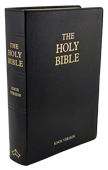1
It is for you, priests, to see that this law of mine is obeyed.
2
Give me neither heed nor hearing, says the Lord of hosts, let my name go unhonoured, and with sore distress I will visit you; falls my curse on all the blessings you enjoy, falls my curse …,✻ to the punishing of your heedlessness.
The repetition, ‘falls my curse’, is difficult to explain, except on the supposition that a word or two has dropped out in the manuscripts.
3
Arm of yours I will strike motionless, bury your faces in dung, ay, the dung of your own sacrifices, and to the dung-pit you shall go.
4
So you shall learn your lesson; my law I gave you, says the Lord of hosts, in token of my covenant with Levi’s family.
5
Live they should and thrive, but the fear of me I enjoined upon them; none but should fear, and hold my name in reverence.
6
Faithfully they handed on tradition, the lie never on their lips; safe and straight was the path they trod at my side, and kept many from wrong-doing.
7
No utterance like a priest’s for learning; from no other lips men will expect true guidance; is he not a messenger✻ to them from the Lord of hosts?
Here, as often elsewhere, the Latin translates ‘angel’.
8
That path you have forsaken; through your ill teaching, how many a foothold lost! Nay, says the Lord of hosts, you have annulled my covenant with Levi altogether.
9
What wonder if I have made you a laughing-stock, a thing contemptible in all men’s sight, priests that so ill kept my command, gave award so partially?
10
Have we not all one Father, did not one God create us all? No room, then, for brother to despise brother, and unmake the covenant by which our fathers lived.✻
This verse does not seem closely connected either with what precedes it or with what follows it. The prophet may have been thinking of other misdemeanours, such as those mentioned in Neh. 5.
11
Here is great wrong in Juda, here are foul deeds done by Israel and Jerusalem!✻ Juda, that was once content to be set apart for the Lord, has profaned that holy estate, has taken wives that worship a god he knew not.
This difficult passage, verses 11-16, is generally understood as referring to the intermarriage of the Jews with surrounding nations; cf. Esd. 9 and 10. But Malachy’s protest is concerned only with foreign brides, not with foreign bridegrooms; and he seems only to envisage those cases in which a Jewish wife has been divorced to make room for a Gentile rival.
12
Doer of such a deed, set he or followed the ill example, shall be lost to the dwelling-place of Jacob, for all his offerings made to the Lord of hosts.
13
And anon, weeping and wailing, you drench the Lord’s altar with your tears! What marvel if I heed your sacrifices no more, gift of yours is none can appease me?
14
And the reason of it? Because the Lord bears witness to her wrongs, that wife of thy manhood’s age, whom now thou spurnest, thy partner, thy covenanted bride!
15
Yet doer of this is the same man as ever, the will of him is unchanged; he asks nothing better, now as before, than to breed a God-fearing race; to that will, men of Juda, keep true. Spurn her not, the wife of thy manhood’s age;
16
what though the God of Israel gives thee leave to send her away if she suits thee ill? Garment of her, says the Lord of hosts, is yet stained with the wrong thou didst her. Will of thine forgo not, wife of thine spurn not.✻
Literally, ‘Did not one man do (or, make)? And his spirit is left surviving. And what does one man seek, except the seed of God? Guard therefore your spirits, and do not despise the wife of thy youth. When thou hatest her, dismiss her, says the Lord, the God of Israel; but wrong shall cover her (or, his) garment, says the Lord of hosts. Guard your spirits, and do not despise’. The Hebrew text, which gives ‘his (not her) garment’, is even more obscure throughout; and numerous explanations have been suggested, without throwing much light on the passage.
17
Oh, but the Lord is aweary of your doings! And little wonder, when you think so amiss of him; telling yourselves, Foul is fair in the Lord’s sight, and wrong-doing well likes him; God that judges us is none.


